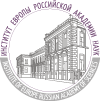Series “Analytical papers of the Institute of Europe RAS”
The series ‘Analytical papers of IE RAS’ has been published by the Institute of Europe of the Russian Academy of Sciences since 2015 and represents a regular expert analysis of global and regional problems related to the foreign policy of Russia, the European Union, the world and domestic economy, the evolution of political systems, social processes, and the religious factor of life in the Eurasian space.

Editor-in-Chief: Kirill Gusev, Cand. Sc. (Economics), Leading Research Associate, Center of Monetary and Financial Studies, Institute of Europe, Russian Academy of Sciences.
Principles of Transparency and Best Practice in Scholarly Publishing
Sergey Roginko “‘Food racism’ in the EU: the problem persists?” Analytical papers № 7, 2021 (№237)
The paper explores the problem of double standards of quality of the goods produced in the EU by multinational companies for Western and Eastern Europe. Reality of the problem is demonstrated by the studies conducted in individual EU countries, revealing the difference in quality of the products sold in Eastern and Western Europe. The political resonance of this issue and effects of the measures by the European Commission to solve it are evaluated. The research takes into account the factors of COVID-19, reduced mobility and digitalization of trade.
Vladislav Belov “Party and political situation in Germany after a year of coronavirus pandemic.” Analytical papers № 6, 2021 (№ 236)
In March 2021, a year after the start of decisive anti-coronavirus actions of the German state at federal and regional levels, Germany found itself in the center of the third pandemic wave. Unlike spring 2020, the government was unable to provide adequate responses to the new challenges, lowering the popularity of CDU / CSU union, the backbone party leader of Germany, and questioning the effectiveness of interaction mechanisms between the lands and federation.
Elena Ananieva, Kira Godovanyuk “UK National Security Strategy.” Analytical papers № 5, 2021 (№235)
The new UK national security strategy review (March 2021) has an integrated character, for the first time uniting the spheres of defence, security, development and foreign policy in one concept. This paper explores the evolution of the Johnson government approaches to the content of the strategy in the context of post-Brexit and its implications on UK-Russia bilateral relations.
Vladislav Belov “Land elections in Rhineland-Palatinate and Baden-Württemberg as indicators of party and political trends in Germany.” Analytical papers № 4, 2021 (№ 234)
On March 14, 2021, elections in the Landtags of Rhineland-Palatinate and BadenWürttemberg were held. They were the first in the election marathon in Germany this year. Their results reveal the current electoral attitudes six months prior to the parliamentarian election to Bundestag, as well as the scenarios of governing coalitions, which may emerge in September. The paper analyzes the Landtags election results in the context of their significance for party and political processes in the Federal Republic of Germany.
Vladimir Vernikov “Elections in Catalonia – a test for the government in Madrid.” Analytical papers № 3, 2021 (№ 233)
This paper is dedicated to the parliamentary elections that took place on February 14, 2021, in Catalonia, an autonomous region that has been seeking independence from Spain for many years. The largest number of mandates (33 each) in the regional parliament were received by the Catalan Socialists (PSC) and the Republican Left (ERC) – proponents of independence. 32 mandates were obtained by another separatist party «Together for Catalonia» (JpC), formally led by the former head of government K. Puigdemont, who is hiding from Spanish justice. Arithmetically, none of the parties of the trio is capable of independently forming the region’s government – Generalitat. It is difficult to forecast how the parties will interact to obtain the majority and vote of confidence: their internal contradictions and differences in visions of the region’s future are too significant.

